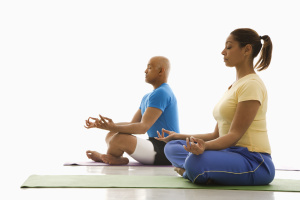What is meditation?
This post provides a Meditation overview. Meditation is the practice of focusing and training

your mind to achieve an alteration in mental state, whether bring the mind to focus on an image, or trying to still the mind so that other areas become more apparent and you “become one with the universe”. The images you probably have of meditation probably involve sitting cross legged for hours at a time, chanting “OM” constantly and this is often how it is presented in popular culture, but it really doesn’t have to be like this.
There are lots of different types of meditation that can be practiced by people wanting to meditate and they are ways that give you something to focus on and then allow it to drift away and the constant chatter that happens disappears. Most of them are ways to encourage you to “live in the present” rather than worrying about the past or future. This living in the now is the reason I frequently suggest people do some sort of meditation if they are stressed or anxious. Some of the different types are:
- Visualisation: Your focus is to see images in your minds eye. This can be imagining a candle flame in your mind, or a walk in your favourite woodland/park/outdoor space. This can be quite difficult to start with, as your mind is likely to struggle
- Guided: This is a mixture of methods where you are talked through the techniques by someone else. This can be someone leading a meditation group or a CD/tape of someone (it could even be yourself reading through a meditation technique you want to do). Having someone telling you what to do can be a very good way of keeping the mind focused on the meditation and not getting caught up in your thoughts.
- Breathing: Focusing on the breath is one of the most basic forms of meditation and is something that is practiced all around the world.
- Mindfulness: This is the buddhist form of meditation and its focus is many forms of living in the present. Breathing is used as a focus initially, but the stillness that this creates is then taken to other areas of your life and you become aware of what you are doing throughout many other aspects of your life.
- Chanting: This could be the saying of a religious prayer, repeating an uplifting motivational statement or chanting a short phrase (mantra) or making and experiencing a sound (such as OM or Aum) to act as the focus for the mind.
- Transcendental Meditation: This is a form of mantra meditation that became popular in the 1950s and 1960s and is still widely taught and practiced to this day.
- Other forms: This is the extension of mindfulness so that all areas of your life can become a form of meditation. You can meditate on the sensations of texture/smell/taste as you eat a meal (or start with a grape if that’s too much). The feelings/sounds/smells that surround you as you walk, and even the footsteps that you take can be the focus (though this should only be done somewhere safe, not on a busy high street). Some even talk about meditating when washing up. Anything can be used as your focus for your mind.
I am also of the firm belief that you can spend a shorter amount of time doing “quality” meditation more frequently rather than feeling guilty about not being able to spend an hour each day doing it. Things like breathing style meditations, walking meditations can be slipped into your daily routine in short bursts, but it is always good to have time to spend on other areas such as visualisation that need more time given to them to really benefit.
Short Breathing exercise:
Try focusing on your breathing for ten breaths three times a day:
- really feel how the air moves into and through the body,
- what parts of the spine move and at what point in the breathing cycle
- do you feel your ribs moving? if so where (top, middle or bottom)
- Do any thoughts crowd into your head? if so then note what they’re about and return to watching your breath, you can deal with what they were about after you’ve done the 10 breaths.
- When you finish do you feel any different?
Then when you have more time try doing the same for longer, or search out and attend a meditation group.
I run a drop in meditation group every Monday at the Clerkenwellbeing Studios at 1pm. Booking can be done via Clerkenwellbeing's own site.
